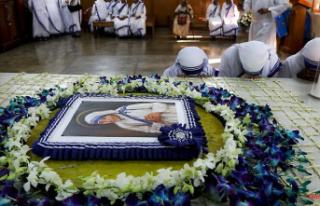At the 1972 Olympic Games in Munich, there was boisterous celebration, laughter and sporting entertainment. But then comes September 5th - and with it death and unspeakable suffering. 50 years later there are still many unanswered questions.
When the Summer Olympics opened in Munich on August 26, 1972, the mood was cheerful; ten days later, sheer terror reigned. At 4:55 am on September 5, Palestinian terrorists from the Black September organization invaded the Israeli team's accommodation in the Olympic Village. They shoot two athletes and take nine hostages. A horror act that only ends late in the night in a bloodbath in which nine hostages and a policeman die. The sports competitions are suspended and resumed after one day. "The Games must go on" is the highly controversial slogan.
Today, September 5th, the murdered people will be commemorated in Munich. But the celebrations for the 50th anniversary were accompanied by long discussions in the run-up: Victim families consider the handling of the attack to be just as inadequate as the compensation paid so far, so they called for a boycott of the event.
An agreement was only reached a few days before the anniversary - 28 million euros are said to flow from Germany to the eleven families of the Israeli survivors. For this purpose, the events of that time are to be dealt with by a commission of historians, staffed with experts from Germany and Israel. Former FDP Interior Minister Gerhart Baum had negotiated the package with the bereaved.
50 years ago, the world watched as games of peace turned into games of horror in Munich. The attack in the early hours of the morning is followed by grueling negotiations, the assassins keep issuing ultimatums that expire. Attempts to get to the hostages fail. The then Federal Minister of the Interior, Hans-Dietrich Genscher, and others offered to be substitute hostages, without success. The terrorists eventually demand a plane to fly to Cairo with their prisoners. A machine is being made available at the Fürstenfeldbruck airfield, and at the same time the security forces are working flat out to find ways to free the trapped athletes.
When two helicopters with terrorists and hostages on board land in Fürstenfeldbruck at around 10:30 p.m., the catastrophe ensues. All hostages and a policeman die in a hail of bullets in a wild exchange of gunfire. Five assassins are also killed. Three others are arrested, but are already freed in October with the help of a plane hijack.
A debacle that entails the sharpest allegations about the procedure and leaves many speechless and at a loss. The journalists Uwe Ritzer and Roman Deininger have compiled the events for their book "The Games of the Century". They list many glitches in it. The assassins were able to follow the police actions in the Olympic Village live on TV because everything was broadcast on TV worldwide. Later that night, it was falsely announced that the hostages in Fürstenfeldbruck had been successfully freed - hours later their deaths had to be reported.
Deininger and Ritzer also criticize what happened in the decades that followed. In particular, that a place of remembrance was only created in the Olympic Park in 2017 after more than 40 years. "The fact that it is taking so long can only be understood as a continuation of the failure of 1972," they write. "Perhaps the sad truth is that those in charge are reluctant to flaunt their catastrophic mistakes."
In the book "Anschlag auf Olympia", which was published a few months ago, Sven Felix Kellerhoff recounts the events in minute detail. For half a century there has been a debate as to whether the drama could have been prevented through better preparation and whether those responsible reacted appropriately. "The answers are disturbingly clear: Yes, September 5, 1972 could have been prevented, and no, those responsible did not react appropriately," he says.
But the reality is more differentiated. Kellerhoff refers to the security concept, which was supposed to present a friendly host country 27 years after the end of Nazi terror. Nevertheless, the author also sees serious omissions by the police in the run-up to the games.
Politics drew consequences. Three weeks after the attack on September 26, 1972, the special unit GSG9 was founded - for anti-terrorist operations and to free hostages. The state also gave money: around 4.6 million euros in 1972 and 2002 as a humanitarian gesture for those affected. In addition, around half a million euros in services from the National Olympic Committee and donations from the German Red Cross. In 1994, families demanded 40 million marks (around 20.45 million euros) in damages because of massive mistakes during the police operation. A lawsuit that failed due to the statute of limitations.
Ankie Spitzer became the face of the bereaved for decades. For her, what she paid was not enough to make up for the death of her husband, the fencing trainer André Spitzer. "I would have forgiven them long ago, but they were always so absurdly humiliating," Spitzer recently told Deutschlandfunk. Germany initially did not want to pay more, also to avoid creating a major imbalance in comparison to the compensation paid to other victims of terrorism.
The German authorities are not the only opponents of the bereaved in the matter: in 2012, during the London Olympics, they seriously accused the International Olympic Committee of refusing their request for a minute's silence during the opening ceremony.
Ilana Romano, widow of the murdered weightlifter Yossef Romano, cannot forget either: "Even after 50 years, it's still difficult," she said in Tel Aviv. "Some say that time heals wounds. And I say: Absolutely not! Time has not healed them, everything is still crystal clear, we remember every detail."












